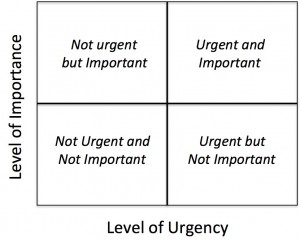Values and the Impact on Short-Term vs. Long-Term Thinking
Would you call it short-term thinking for a company’s leaders to be single-mindedly focused on generating a profit this month (or quarter, or this year)? What about committing to launch a new product in 30 days, no matter what?
Would you call it long-term thinking if a company’s leaders state a strategic goal as having their corporate brand be known as bold and innovative? What about consistently scoring high as one of the best places to work?
 We all make assumptions about what is short-term vs. long-term thinking.
We all make assumptions about what is short-term vs. long-term thinking.
A common assumption is that short-term thinking is bad – at least for some (i.e. employees, customers, investors, suppliers, the community, etc.) – and that long-term thinking is better. This is a dangerous assumption.
The question we should ask is: What’s the difference between short-term and long-term thinking?
The answer is:
- Short-term thinking is about the present, or immediate future.
- Long-term thinking is about the distant future.
Effective leaders know that dealing with the present and future is like talking about apples and oranges. While they are both measures of time (like apples and oranges are both fruit), managing the present and future of a company require completely different skill sets.
Managing the Present vs. the Future
A helpful way to think of the difference in managing the present vs. the future is this popular maxim:
- Managing the present is about working IN the business.
- Managing the future is about working ON the business.
Of course, there are costs (trade-offs) associated with these different managing styles.
The biggest cost comes from being wrong – making a mistake – in the present and/or the future. Is one managing style more harmful than the other? I would argue that bad decisions in both could have devastating effects.
I would also argue that the costs associated with decisions made based on short-term thinking (the present) and long-term thinking (the future) are the same. They both impact:
- Relationships. Even though some deny it, business is always about people. All decisions can either improve or hurt relationships, both existing and new, inside a company and in the marketplace.
- Opportunities. Every decision has the potential to open doors or close them. This is true with with customers, employees, shareholders, suppliers, the community, etc.
- Financial health. A company’s bottom line (profit) is either growing or declining. Without a healthy bottom line, the future disappears. Yet sacrificing future potential to achieve short-term goals also makes the future disappear. This is always a delicate balance.
- Brand equity. A company’s overall value is also either growing or declining over time. An important sign of company health is the consistent building of brand equity. This is the accumulation of good decisions made both short-term and long-term.
So what does all of this have to do with values?
Values and the Impact on Short-Term vs. Long-Term Thinking
As I frequently state when I present to various groups, Differentiating Values set strategic direction and create competitive advantage. They focus all stakeholders on what is truly unique, define a meaningful purpose, and increase brand value.
Common Values identify expected behavior for all employees, including leaders. They highlight how employees should work with each other and the type of interactions customers can expect with the company.
So a company’s stated values – made up of both Common Values and Differentiating Values – help all stakeholders understand what is produced or provided, how it gets done, who is involved, where it belongs, and when and why it matters.
Not surprisingly, stated values benefit BOTH short-term and long-term thinking. But in different ways.
Values and Short-Term Thinking
 Prioritizing problems. Every day managers must prioritize challenges and opportunities. Consciously or unconsciously, they evaluate everything based on the urgent vs. important matrix, where urgency almost always wins out. Managing by values help ensure urgent decisions are made that are consistent with long-term goals and objectives.
Prioritizing problems. Every day managers must prioritize challenges and opportunities. Consciously or unconsciously, they evaluate everything based on the urgent vs. important matrix, where urgency almost always wins out. Managing by values help ensure urgent decisions are made that are consistent with long-term goals and objectives.- Managing through a crisis. When training for crisis management, leaders are taught to clearly state what is KNOWN and UNKNOWN, and always say what is TRUE and what is POSITIVE. But how do leaders make decision during a crisis? Managing by values is the perfect way to ensure decisions in a crisis not only solve short-term problems, but are also are aligned with long-term goals and objectives.
- Dealing with people issues. When employees are reprimanded or even fired for violating stated values, it sends a powerful message to ALL employees of what matters most. As I wrote in a previous article, unhealthy tolerance can lead to bad companies. Over the long-term, managing by values help ensure the wrong people leave and the right people remain.
Values and Long-Term Thinking
- Setting strategic direction. Where should the company be in 3 years, 5 years, and longer? Leading by values help detect future target markets; identify future customer problems to solve; determine which business investments make the most sense; and how best to communicate with customers in the future. In addition, stated values (should) identify what is truly unique and how the company can create competitive advantage.
- Hiring the right talent. Incorporating values into the hiring process ensures a company identifies and hires the right people. Not only will this contribute to a stronger, healthier culture, it builds a powerful team. Important note: companies can still ensure the positive effects of diversity when hiring, while confirming everyone shares in the company’s stated values.
- Developing a healthy culture. When employees know they will be recognized and/or rewarded for decisions and behaviors that support stated values, it creates a culture of good habits that support long-term goals and objectives. This also improves overall productivity and employee satisfaction, while reducing the cost of employee turnover (of highly-valued employees).
Bottom line: Values are a powerful (and often under-utilized) tool that help leaders lead, managers manage, and keeps everyone focused on what’s truly important – in both the present AND the future.
Do you see any downside (costs) to managing by values, either short-term or long-term?









